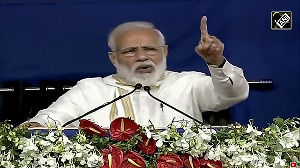In the years to come, the Bandra-Kurla Complex will be world class," says T Chandrashekhar, additional commissioner, Mumbai Metropolitan Regional Development Authority, the bureaucrat who has been entrusted with turning the area into the city's financial nerve centre. The wide windows of Chandrashekhar's office offer a panoramic view of the entire 130-hectare complex.
In the foreground are the slums, a reminder of times when the area was the dumping ground of Kurla's industrial sprawl; in the background are the majestic glass and steel structures of companies that have bet on the area - ICICI, Citibank, State Bank of India, IL & FS, Bank of Baroda, Securities Exchange Board of India, Reserve Bank of India - quite literally the who's who of Indian financial markets.
The 4,000 families living in the slums will be gone in a year's time, promises Chandrashekhar, who's chalked out an ambitious Rs 3,000 crore (Rs 30 billion) plan to rehabilitate the slum dwellers elsewhere. The area will be home to swanky international-standard office complexes, five five-star hotels, hospitals, a convention centre, mini golf courses and a drive-in theatre with an entertainment complex.
The Bandra Kurla Complex
The first to bet on the area, known ubiquitously as the 'Complex' to all rickshawwalas in Bandra, was the Diamond Bourse that bought land at Rs 42,500 a sq mt in 1995, while in 2000 Citibank bought at Rs 86,000 a sq mt. When Jet Air bought early this month, it was priced at Rs 153,000 per sq mt per FSI. At two FSI, the effective price was Rs 300,000 per sq mt.
Between 1995 and 2006 a flurry of institutions - from hospitals to sport associations - have sought refuge in BKC. The Asian Heart Institute has set up what is considered one of the best facilities for heart care in the city here, while the Mumbai Cricket Association has bought land for a state-of-the-art indoor cricket stadium and training facility.
Others who have sought a BKC address include the Regional Passport Office, the Income Tax department, the Maharashtra Maritime Board and Institute of Chartered Accountants, in addition to a host of financial institutions.
By the end of the year, an additional 800,000 sq ft of commerical space will be added, while the convention centre for which Mukesh Ambani's Reliance Industries outbid brother Anil, is expected to come up in four years. The entertainment complex with the drive-in theatre and the mini golf courses are still in the planning stage.
Says Anuj Puri, MD of Trammel Crow Meghraj, the real estate consulting firm, "Recent land sales have established that the Bandra-Kurla Complex is the next Nariman Point. It is now Mumbai's second business district, not the secondary business district.
Also, the occupier profile has changed -- while Nariman Point now has liaison or representative offices, it is the Bandra-Kurla Complex that corporates come to when it comes to larger floor space needs." Built-up real estate rental prices in BKC are almost neck and neck with Nariman Point -- Rs 130-145 per sq ft in Nariman Point versus Rs 120-135 per sq ft in BKC.
Also, BKC has more built up space available compared to Nariman Point - 2.32 million sq ft in Nariman Point against 15 million sq ft at BKC, and with far better connectivity, both existing and planned.
Compare this to Nariman Point: the only new development in the 40-acre, one-time commercial hub over the last 10 years is the tony CR2 mall, which houses the Inox theatre. The majority of building activity in the area today consists of repairing and refurbishing 30 year-old buildings. And yet prices in Nariman Point continue to be among the highest in the city.
Santosh Kumar, COO, Trammel Crow Meghraj, offers a reason: "As long as the Bombay Stock Exchange continues to be in the Fort area, Nariman Point and the Fort area will retain their premier status. Corporate houses and financial institutions will continue to keep their corporate headquarters there while seeking to move bulk space requirements to BKC. And let's face it, no Mumbai head honcho wants to commute to the suburbs when he can have an office in 'town'."
Development in BKC is piggy-backing on the promised infrastructure development in the area: A metro rail connectivity that is expected to be up and running by 2013 with the World Bank's help; a water transport plan that will connect faraway suburbs like Mank-hurd to workplaces in BKC; six additional roads that will make connectivity with suburbs like Santa Cruz, Kurla and Ghat-kopar painless. With MMRDA auctioning plots for residential purposes, it is also likely to see some high-end residential developments.
Mill Lands
The fate of the central Mumbai mill lands spread of 600 acres still hangs fire to a large extent as the Supreme Court is yet to decide on the validity of the 2001 amendment to DCR 58 of the Municipal Corporation of Greater Mumbai.
Under the amended rule, the private millowners were allowed to develop the lands without surrendering two-thirds of it to the city for low-cost housing and open green spaces, if they maintained the old structures.
This amendment was challenged by the Bombay Environmental Action Group in the Bombay High Court. The millowners are currently awaiting the Supreme Court's decision on the validity of the amendment.
Of the 58-odd mills in the city, nearly half are owned by NTC, of which eight have been sold. Of the 32 in private hands, five mills have been fully developed, 19 are partly developed, while in six mills no developments have taken place.
The developers who have bought the NTC property are looking at mixed-use properties with retail, commercial and hospitality all under one roof. DLF, which paid the highest for the 16.5 acre spread of Mumbai Textile Mill, is planning to build a state-of-the-art mega mall and a five-star deluxe hotel on 980,000 sq ft, of which 700,000 sq ft will be devoted to the mall.
At Jupiter Mills, which was bought by a joint venture between the US-based Farrallon and India Bulls, and demolished completely prior to the case now being heard by the apex court, a mixed use commercial property with an IT focus is expected to come up.
Kohinoor Mill, which was bought by the erstwhile Shiv Sena combination of Raj Thackeray and Manohar Joshi's son, Unmesh Joshi, is slated to house a retail and multiplex in a 4 lakh sq ft spread. The Lodha group, which bought the Apollo mill land is yet to announce its plans.
Analysts point out that while the Supreme Court has validated the NTC sales and allowed the buyers to go ahead with their plans, the full extent of possible development planned in this area will be known only after the court delivers its final verdict. They also point out that because of the delay caused by the court cases, development in the area have been pushed back by as much as two years.
Another Shanghai in the making?
Will all this make Mumbai a world-class city? "It can certainly make Mumbai a better Mumbai, but not a Shanghai or a New York," says Akshaye Kumar CEO of the Canadian real estate consultants Colliers International. "If some of the development that we are seeing now had happened 15, or even 10 years ago, then perhaps yes."
Adds Sanjay Das, executive director, agency services, Cushman Wakefield India, "What is lacking in Mumbai's case is the political will to change. In cities all over the world there is a blueprint for what the city stands for; in Mumbai's case it is not one blueprint, but several - heritage city, financial hub, services hub - which one do you go with?"
Analysts point that the city's image was tarnished by last monsoon's flood, which claim-ed over a thousand lives and kept the city submerged for three days. Said an analyst, "The foremost characteristic of a financial hub is that it attracts the best talent, but in Mumbai's case after the floods, talent is afraid to come, though in the past it has always attracted the best talent in the country."
Santosh Kumar also points out that Mumbai will now have to fight for its place under the sun with upcoming centres like Pune, where real estate prices are more realistic. "While Mumbai will retain its glamour, it will have to fight off competition from Pune, just as Bangalore is fighting Chennai, simply because neither city has planned its infrastructure."







 © 2025
© 2025